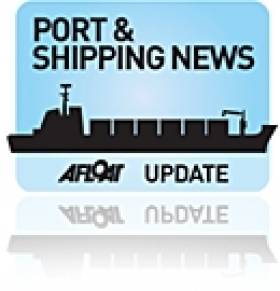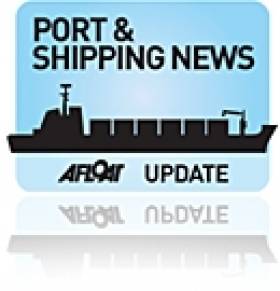Displaying items by tag: Irish port volumes
Irish Ports and Shipping Volumes Remain Steady in Third Quarter
#PORT & SHIPPING – According to the Irish Maritime Development Office (IMDO) the volume of port and shipping traffic through the Republic of Ireland remained relatively stable in the third quarter of 2012.
The latest analysis of the traffic data indicates that two of the five principal freight segments returned to growth in the third quarter, two declined and one remained unchanged.
Lift-on/lift-off (Lo/lo) trades declined 2%
Container traffic (Lo/lo) has declined by 2% during the third quarter of this year. Exports, as a subset of these figures fell for the second consecutive quarter, declining by 3% as weaker demand conditions prevailed, particularly in the Euro zone area. However, exports to other markets in Asia, South Africa, and both North and Latin America remained relatively firm. Imports declined by 1%, representing the 19th consecutive quarter of declining import volumes. However, the rate of decline in this segment has eased considerably over the course of 2012, possibly indicating the market might be finally bottoming out.
Roll-on/Roll-off (Ro/ro) traffic was unchanged at 0%
Roll-on/roll-off (ro/ro) traffic remained unchanged in the Republic of Ireland for Quarter 3 compared to the same period last year. The majority of ro/ro freight from Ireland is destined for Great Britain which continues to underperform, with leading economic indicators recording weaknesses in the retail and manufacturing sectors. Nonetheless, this is a slight improvement for this shipping market segment having recorded two consecutive quarterly declines earlier this year.
Dry bulk volumes increased by 13%
Dry bulk shipments, which make up the largest volume of traffic throughput at Irish ports, grew by 13% during the third quarter of 2012. Improved domestic demand for agricultural products contributed to the rise while exports of ores and other industrial commodities also performed well.
Tanker/Liquid bulk market increased by 9%
Liquid bulk volumes of tanker based petroleum products increased by 9% in the third quarter. This increase was primarily as a result of large volumes of crude oil being transhipped at Bantry Harbour's oil storage facilities. Excluding Bantry, volumes would have seen a decline of 8% in Quarter 3, which perhaps more accurately reflects domestic demand for petroleum products.
Break bulk volumes down by 10%
Break bulk volumes, which represent the smallest segment of the domestic market, continued to decline into Quarter 3, falling by 10% with no rise in demand for construction related materials such as steel or timber. Demand in this segment remains at historically low levels.
Outlook: The outlook for the remainder of the year appears to suggest slightly improved conditions in both import and export volumes. This is as a result of a modest pick up in seasonal trade observed during October and early November. Nonetheless, market demand conditions going forward into 2013 remain challenging. The Euro-zone officially entered into its second recession since 2009 during the third quarter this year, while continued uncertainty regarding Greece and some other member states still remains.
Globally, much focus has been on the slowdown in the Chinese and other Asian economies. The Irish growth forecast has also been revised downwards for 2013. Sentiment amongst major shipping lines and shipowners remains low. Many shipowners have to deal with a large over supply of shipping capacity in almost all sectors along with weak underlying trade demand, increased operating costs and record low charter markets.
First Quarter Boost for Drogheda Port
#PORTS & SHIPPING – After the first three months of 2012 Drogheda Port Company reported figures well above average in the port sector with throughput growth posting an impressive 59% increase on the corresponding period of last year.
Over 228,000 tonnes of cargo was handled by the Co. Louth port and for the first time the balance of trade in the port equalised with 50% of the volume represented by imports and 50% of the volume represented by exports.
The volume growth at the port is very much export led with a number of indigenous industries focusing on the European and UK markets as outlets for their products.
As previously reported on Afloat.ie a new tonnage record was set in January when the Arklow Bridge (2011/4,723grt) carrying 7,175 tonnes of maize representing the largest ever single cargo handled in the port.
Mr Paul Fleming, Drogheda Port Chief Executive said "Drogheda Port continues to provide a strategic import/export location for our customers with a service more flexible and cost competitive than other larger ports. This is helping us to win new contracts and grow our business".
He added: "The ports performance demonstrates the economy is rebalancing towards exports at a time when our economic recovery is very much dependent on being driven by our exporting firms."
The outlook for the Irish port sector for 2012 looks likely to be testing for the domestic port and shipping sectors and according to the port they project to continue above average volume increases for the year.
In May the port can look forward to hosting its first cruise call by the Clipper Adventurer (1975/4,367grt) as previously reported. The vessel will be undertaking its inaugural circumnavigation of the island of Ireland visiting a number of destinations including Drogheda and the Boyne Valley.

























































